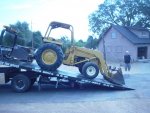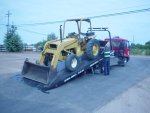Moringa-farmer
Farm Hand
- Messages
- 12
Dear Farmers, Contractors, Tractor operators of all types,
This comes to you in the form of a question: What in God's Green Earth were the designers thinking when they (the many manufacturers) decided (nearly all of them have conspired) to frustrate the industry by replacing a SIMPLE, tried and true method of braking with a complex, usually inaccessible means, such as the industry standard now employs: (internal, wet shoes/plate arrangement)?
No back-yard mechanic without the facility (and extra tractor for lifting) is likely to saddle up such a problematic horse. The entire tractor needs to be split in half and the rear end disassembled. No small task to be sure!
So maybe there is a good reason, but I fail to see any for the integrated internal system of braking. Why not use a pair of big, heavy, thick, discs inboard near the wheels and keep the calipers up out of harm's way, but still easily accessible? They don't even need to be hydraulic. A simple leveraged rod will surely suffice. The extra weight might be intentional, since it is an advantage, not like in the auto industry where every extra pound is a disadvantage.
'Makes me wonder. Because it really doesn't make good sense to complicate and integrate such a thing as brakes.
Ray
This comes to you in the form of a question: What in God's Green Earth were the designers thinking when they (the many manufacturers) decided (nearly all of them have conspired) to frustrate the industry by replacing a SIMPLE, tried and true method of braking with a complex, usually inaccessible means, such as the industry standard now employs: (internal, wet shoes/plate arrangement)?
No back-yard mechanic without the facility (and extra tractor for lifting) is likely to saddle up such a problematic horse. The entire tractor needs to be split in half and the rear end disassembled. No small task to be sure!
So maybe there is a good reason, but I fail to see any for the integrated internal system of braking. Why not use a pair of big, heavy, thick, discs inboard near the wheels and keep the calipers up out of harm's way, but still easily accessible? They don't even need to be hydraulic. A simple leveraged rod will surely suffice. The extra weight might be intentional, since it is an advantage, not like in the auto industry where every extra pound is a disadvantage.
'Makes me wonder. Because it really doesn't make good sense to complicate and integrate such a thing as brakes.
Ray



